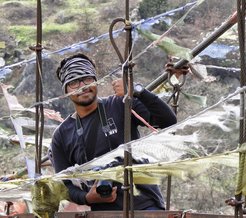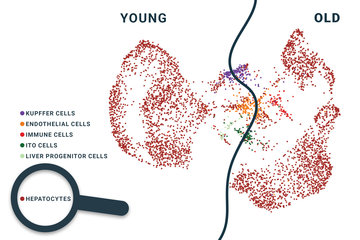Education is a valuable commodity
Suhrid Ghosh from India spent considerable time in the Himalayas researching hoverflies, and recently took up a doctoral position at the Max Planck Institute of Molecular Cell Biology and Genetics in Dresden. The 24 -year-old hopes to one day return to his home country as a teacher.

I love hiking and camping, and living and working in nature. If I had the choice, I’d always prefer field work in the jungle to working in the lab. But some things just can’t be studied in the jungle, which is why I came to the Max Planck Institute of Molecular Cell Biology and Genetics a couple of months ago as a Ph.D. student. Education is a privilege in the tiny Himalayan village where I was doing field work for my master’s degree: I frequently saw the children gathering in front of their teacher’s house in the early morning hours to pick her up for the hike to the schoolhouse – a cumbersome journey over hill and dale.
They marched 12 kilometers uphill in the morning and back down in the evening just to be able to go to school. Curiosity was their sole motivation – and maybe the hope for a better life. In the afternoons, they would visit us researchers, asking about our experiments. We were studying hoverflies and how they orient themselves in the mountains to find their flowers. The village children intuitively knew why this is important, and had their own unspoiled perspective on the topic – much better than grown-ups.
It is indeed a great gift when nature is so tangible for kids. I grew up on a small farm close to Calcutta. My ancestors were traditional dairy farmers. I knew exactly how to wash a cow, how to milk her and how to keep the barn in check. At the same time, however, I was very lucky to have had direct access to education, which is not the norm in populous India. There are so many people here with great ideas, but many of them have never actually attended school, despite education being one of the most fundamental human rights.
When my time as a scientist is over, I’d like to get involved in this very issue and work as a teacher in India – I imagine this to be very fulfilling, because teachers have an important function in Indian society. After all, it was a teacher at my high school who told me about the Max Planck Society as a research organization. He had once had a very bright student, named Rupak Majumdar, he said, who is now even a Max Planck Director. So Rupak became sort of a role model for me, since he came from the same city and was now an internationally recognized scientist. Many years later, when I was doing my master’s degree, I remembered the name Max Planck and I applied in Dresden. Of course it was a big transition for me, but my colleagues at the Institute are very friendly and helpful. And they told me that there are really great opportunities for hiking and climbing in the Elbe Sandstone Mountains, also known as Saxon Switzerland. I hope to try that out very soon.












